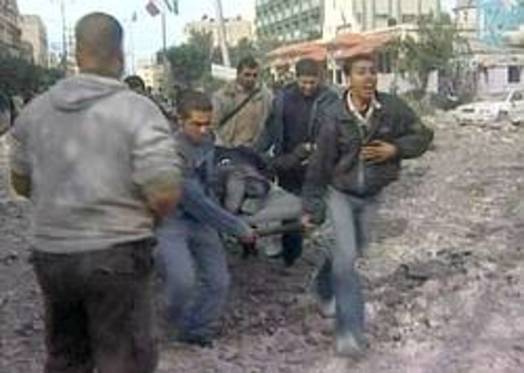
Less than a week after truce with Hamas expired, Israel initiated air strikes into the Gaza Strip, which it has occupied for six decades. Israel first announced it would put an end to the Hamas rule in Gaza and turned the region into a hell with air strikes on the Sabbath, a sacred day in Judaism on which working is forbidden. The missile fired from Israeli jets killed about 380 people, some of them women and children, and wounded more than 1,000 people mainly in Gaza City as well as Rafah and Khan Younis. Israel and Hamas signed a six-month truce in last June and refused to renew it after expiring last weekend.
Graduation ceremony hit
Most of the Hamas security buildings in Gaza City were targeted and destroyed in air strikes. A graduation ceremony was being held for new police recruits for Hamas security force when missile hit one of the security compounds. First Israeli strikes began just when students were leaving schools.
Gazan resistance groups fired scores of rockets into Israeli cities after the air assault and vowed to take 'revenge.' Four Israelis were killed in rockets attacks into Israeli cities. Hamas leader Ismail Haniya urged Palestinians to 'unite' against the Israeli aggression. The Hamas targets were designated in intelligence gathered a several months ago. Israeli leaders had earlier signaled an operation into Gaza was likely. Israeli Minister of Foreign Affairs Tzipi Livni had threatened to topple Hamas and Defense Minister Ehud Barak had stated Hamas would pay huge price ahead of the air assault.
Following the surge of attacks into Gaza, France, Russia, Turkey, Pakistan and the European Union accused Israel of using 'disproportionate force.'
Egypt condemned Israeli air strikes on the Gaza Strip and sent 500 police officials to the Egypt-Gaza border, an anonymous Egyptian security official said. Egyptian President Hosni Mubarak ordered the opening of the Rafah border gate to let in wounded Palestinians for medical treatment.
The Israeli military made a statement saying air strikes on Gaza were "an initial stage." Avi Benayahu, spokesman for the Israeli military, called Gaza strikes as a first stage. Although Israeli President Shimon Peres ruled out the idea of a ground offensive into the Gaza Strip, government officials stated they were considering expanding air strikes into Gaza. "If deemed necessary, operation might be expanded and perpetuated depending on advice of military commanders," an aide to Barak said.